- Home
- Amanda Flower
Matchmaking Can Be Murder Page 2
Matchmaking Can Be Murder Read online
Page 2
When she climbed back into her wagon an hour or two later, I reached up and squeezed her hand. “You will be fine, my dear. Gott is with you in all things.”
She nodded, but her body was as tense as a clothing line stretched from tree to tree.
Phillip and Peter were in the back of her wagon, tethered to the sides. They butted heads. A small part of me ached to see them go. I knew they would be back in a few days after they had cleared the land for Edith. But it would be a long, quiet night on my little farm without them.
“You will feel better when you can put this behind you,” I said.
She smiled down at me from her seat in the wagon. “This is true. It’s best to get the worst done as soon as possible, so that you can move on to the gut again.”
“That is right.” I grinned. “It seems to me that you have been listening to my favorite sayings all these years.”
Her smile fell into a frown. “I have always listened to your advice, Aenti, and if I have made the wrong choices along the way, that is my fault and my fault alone.” She flicked the reins on her wagon and the horse backed up and turned the wagon around in the driveway. I watched her go. The cries of the goats when they saw me staying behind pierced my heart. I would visit the greenhouse the next day to see how both Edith and the goats were getting on. I prayed Edith accomplished her difficult task before fear caused her to change her mind.
I brushed my hands on my skirts. It was time to head into the village for the Double Stitch meeting. I walked back to the house and tried to put these worries behind me. As the saying went, “Every moment of worry weakens the soul for its daily combat.” It was a saying I often repeated to Edith and Enoch when they were small. This one made me laugh a little to myself, considering we Amish were pacifists.
I drove to the village in my secondhand buggy, which was hitched to my mare Bessie, a gift from one of my brothers. She was a light brown Haflinger with a bright white star on her forehead. I was one of ten children. There were only four of us left in the world—two of my brothers and one sister—and now that I was back in Ohio, we all lived within an hour’s buggy ride of each other.
I inhaled deeply as I came to the outskirts of the village. The apple trees that had been in full bloom just a week ago were leafed out with bright green leaves. We were on the edge of summer, and the village of Harvest was getting ready for it. It was the busy season of the year in Holmes County. Busloads of Englischers would descend on the village, which was just what community organizer Margot Rawlings was counting on. From what I had heard, she wanted everything to be bigger and better in Harvest this year. If she was behind the idea, I didn’t doubt that it would happen. She was as stubborn as a bull and as clever as a fox.
On the village square, Amish men and a few Englisch ones were pruning and mowing and making sure that the grounds were perfect. In the middle of the gazebo, I saw Margot with her short brown curls, barking orders.
I flicked the reins and asked Bessie to pick up the pace. I didn’t want to get pulled into the fray with Margot. The best way to avoid that was to avoid eye contact. I parked Bessie and the buggy at a hitching post next to the big white church on the square. That was the place where Raellen, who’d organized our meeting that day at a new café in the village, had told me to park. I counted the other horses and buggies at the post, and it looked like most of the ladies from Double Stitch were already there.
I climbed out of the buggy and hurried down the sidewalk to the café. It was the first time I had been there, but the café was easy to find. It was a freestanding white brick building with a bright yellow sun painted on the side of it that was facing the church. A matching yellow awning hung over the front door. Giant planters of yellow tulips sat on either side of the door. It was bright and shiny and decidedly not Amish.
The last time I lived in the village, the café had been the local hardware store. I had gone into that store with my father and then with Kip many times. The shop had been Amish-owned, like most of the businesses in downtown Harvest, but the café that took its place was clearly an Englisch business. On the sidewalk chalkboard, the specials of the day were listed. Most of them were salads and soups with squash, kale, and berries of which I had never heard. These foods weren’t typical, not for me, anyway. Amish cooking was heavy on meat, potatoes, and pies of every kind. I wondered why Raellen, one of the members of Double Stitch, had picked this place for our meeting. Part of the motivation would be just to get out of the house. As a mother of nine, Raellen was always looking for breaks from her children and husband. I couldn’t say I blamed her. The sheep farm that she lived on with her family was in a constant state of upheaval. It seemed to me that every time I was there, either a sheep or a child was upset about something. Raellen, the Lord bless her, took it all in stride, and I thought she must have been given the greatest patience Gott had ever bestowed on any woman before or since.
I looked through the front window and noted that the decoration inside wasn’t very Amish either. Where our culture called for plainness, the café was anything but plain. The wallpaper was flowered and the tablecloths were covered with a colorful swirl pattern. Even so, many of the features from the old hardware store were still intact, such as the exposed brick wall and some of the pine shelving along those walls. Now instead of tools and nails, the shelves held brightly colored dishes. On another chalkboard on the wall, the specials and the soup-of-the-day were written out.
I opened the front door and a bell chimed. Raellen Raber, my bubbly next-door neighbor and mother of nine children, was already seated with two of the other members of Double Stitch, Iris Young and Leah Bontrager.
Iris was the mother of one fifteen-year-old son. She was a beautiful woman with auburn hair, delicate features, and skin that already held the sun-kissed glow of working outside. She had been very popular with the young men in the district until I introduced her to Carter Young, an industrious young man who had moved to Holmes County from Geauga County to help his grandparents with their farm. Carter’s grandmother had implored me to find Carter a match, so that he would stay in Holmes County permanently. Usually, I don’t make matches without the young man and maedel’s consent, but the moment I saw Carter and Iris together, I knew they were meant to be. After Carter, there was no other man worthy in her eyes, and there shouldn’t be. Carter was her perfect match.
I bit the inside of my lip when I saw Iris. I knew that Carter worked at the same construction company as Zeke. We never spoke of it, but it was even possible the two men were friends. What would Iris think of Edith and even of me when Edith ended her engagement to Zeke Miller?
Leah waved at me from the table. She was my age, and it startled me at times how much she looked like her mother, who’d passed on years ago. Just like her mother, she had steel-gray hair pulled back into an Amish bun and bright pink cheeks that seemed to be in perpetual blush. In my mind, when I think of her, I still see my old schoolmate, who used to sit with me at recess and make patchwork dolls to sell in her father’s general store. The store was no more, and Leah, a mother of five and grandmother of eleven, lived in town over her husband’s Amish gift shop, where they sold Amish-made trinkets and toys to Englischers visiting Harvest. As Harvest became a more and more popular destination in Holmes County, their store rose in popularity too. Leah was always happy to get away from the hustle and bustle of a busy day at the shop.
I smiled and waved back. Other than my quilting circle, there was only one young man in the café, tapping away on his keyboard.
Leah waved again. This time a little more enthusiastically. “Millie, what a blessing that you are here.”
I made my way across the wooden floor, which was so old that it dated back to my father’s childhood. The table was a large circular affair that could fit as many as eight people around it or in our case, five busy quilters. In a quilting circle, you don’t want to be too close to the next person. If you were, you were bound to accidentally elbow your neighbor in the ribs, or even in t
he teeth if the stitching really got going. Every member of Double Stitch took the craft very seriously. It wasn’t long before elbows would start flying. The table was covered with coffee mugs, cookies, quilting squares, and threads of every color of the rainbow.
“I’m happy to be here.”
“And I’m glad that you are here because I want to talk to you about my granddaughter Pippa.”
I nodded, understanding at once. Pippa Bontrager was Leah’s eighteen-year-old granddaughter. She was to be baptized into the Amish church in a few months, and she’d come to me two weeks back asking me for advice and requesting help to find her a match. As of yet, I hadn’t found the right Amish young man. I knew that sweet Pippa was anxious about it, but it was Leah who was the most frustrated.
“You said that you’d find her a husband.”
“Oh!” Raellen said, leaning in. She was a tiny, dark-haired woman with a slim figure despite the nine children she’d had over an eleven-year span. I thought that she had been able to keep her figure by chasing after her brood. Raellen’s was the next farm over from mine, and she was my closest neighbor. It wasn’t uncommon to see her running after one of the children on their family farm or after one of the many sheep in her husband’s herd of fifty strong. The family cleaned, hand spun, dyed, and sold the wool in local shops throughout Holmes County and the neighboring area. “Are you looking for a match for Pippa, Millie?”
Leah scowled at the group’s notorious gossip. “Mind your own stitches, Raellen Raber.”
I sat at the table and ignored Raellen’s question. “I never said that I would find her a husband. I don’t promise anyone that I’ll find him or her a spouse. That’s not a promise that I can keep. I simply told her that I would look for a young man who I believe is compatible with her, her best match and her best chance for a long and happy marriage.”
“Well, you had better find someone quickly. She’s been moping around our gift shop for days, staring out the window.”
I was about to offer some sage advice about not putting so much pressure on Pippa to marry. She was only eighteen. I knew that wasn’t a popular Amish position. Many Amish, like Pippa, want to marry young so that they can make their homes and start their families, but it’s never a gut idea to marry before a person is ready. There was a reason that I hadn’t found the right match for Pippa yet. It might have to do with Pippa. I didn’t say any of that to Leah. I didn’t want to come across as rude. “The right match for her will arrive when she is ready.”
Leah looked as if she wanted to protest, when someone slapped a hand down on one of the tables. “Millie Fisher, as I live and breathe, is that you?”
I spun around and faced the counter, which was lined with bar stools made out of old barrels. I blinked. “Lois?” I jumped out of my seat.
The woman behind the counter had a round face, spiky red hair that was just on the edge of purple, and two pairs of glasses: one pair was on her head and the other was hanging from her neck on a beaded chain. She wore three gold rings with large glittery gems on each hand, but no wedding band.
I hurried over to her and gave her a mighty hug. “I can’t believe it. Lois Kenny?” I asked. “What? How?” I couldn’t even finish the sentence.
She hugged back, saying, “Believe it. Oh, Millie, it’s so good to see you!” She laughed and stepped away, still holding on to my arms. “And you called me Lois Kenny. I haven’t heard anyone call me by my maiden name in decades. I’m Lois Henry now. It was the last name of my third husband, God bless his soul. He passed away five years ago. I didn’t keep the last name of my fourth husband since that marriage didn’t last more than six months. I knew I should never have married a man I met at the poker table at the Rocksino.”
I blinked at her. “Rocksino?”
She laughed again. “Don’t you worry about it. It’s not a place you will ever see, and I have no plans to go back. There are too many old goats wandering around the game floor looking for a woman to take care of them in their old age. I have no interest in that. Four marriages are enough for me. I’m done.”
Behind me Leah cleared her throat.
I spun around. “Oh, I’m so sorry. I just got so caught up in the surprise of seeing Lois again. Let me make introductions. Lois, this is Raellen, Leah, and Iris. We are members of Double Stitch Quilting Circle.”
“I know Raellen, of course. She’s a good friend of my granddaughter Darcy Woodin, who owns this place. Darcy is in the back, whipping up some delicious treats for all of you. We were just tickled when Raellen said that she wanted to have a quilting circle meeting here.”
Raellen beamed. “It’s the most central location for all of us, and I always want to help an old friend.”
“Don’t we all,” Lois said.
Raellen beamed. “I never knew you were friends with Darcy’s grandmother, Millie.”
I smiled at Lois. “I am indeed. We’ve known each other for a very long time.”
“That’s true,” Lois said. “I know all Millie’s secrets.”
Iris’s mouth made a little O. “You have secrets, Millie?”
I rolled my eyes at Lois. “She’s teasing.”
“Am I? What about that time Mr. Lewis’s cow escaped—”
I stepped on her foot lightly, and she barked a laugh. “It’s just like old times already! My, this is such a treat!”
I couldn’t help but smile. Seeing Lois again was such a gift.
“I know Raellen, of course,” Lois said with a smile. “I’m happy to meet all of you and so thankful that you chose our little café for your get-together.”
Leah cocked her head. “How do you and Lois know each other, Millie?”
I could read the expression on Leah’s face. I supposed that I should have expected it. Lois and I made an odd couple of friends. I was Amish in plain dress and no makeup. She was Englisch with wild short hair, jewelry, and makeup to spare. Right now she was sporting teal eyeshadow over her blue eyes. “Lois and I grew up together on the same road. Our families had neighboring farms, and even though my family was Amish and hers was Englisch, the two families were very close. We were the same age, born just a few weeks apart, and spent all the time we could together.”
“Getting into trouble,” Lois added.
I snorted. “You spent time getting into trouble. I spent time getting you out.”
Lois slapped her dish towel on her hip. “It’s so good to see you, Millie,” she said. “What has it been, twenty years?”
“I think so. The last time was when you came from the city for Kip’s funeral.”
She nodded. “God rest his soul. He was a good man, and the perfect match for you.” She grinned. “But being a matchmaker, you would know all about that. Did you ever marry again?”
I shook my head. “Nee.”
“Ah, you were wiser than me then. You found a good one and called it quits. I had to find a real bad one before I gave up on love.”
“Don’t give up on love,” Raellen said with shining eyes.
Lois laughed. “From the mouths of babes.” She waved me into a seat at the quilting circle table. “Sit with your friends. We will catch up later. I need to help Darcy in the kitchen. We will be out in a moment with your food. Let me get you a cup of coffee. You still like your coffee black?”
I thanked her and settled into one of the two empty chairs at the table. I knew the other chair was there for the last member of our group.
Raellen clapped her thin hands. “What a small world!”
“Even smaller in Holmes County,” Leah said.
“When everyone arrives, I have some interesting news to share.” Raellen glanced at me.
I frowned. Gossip, I would guess; it was Raellen’s favorite pastime.
“Where’s Ruth?” Iris asked.
I was just about to ask the same question when Ruth Yoder, a square-shaped woman with steel-gray hair and a take-charge demeanor, walked through the door with her quilting basket on her arm. Ruth saw herself as the lead
er of our little band of quilters because she was the bishop’s wife. No one bothered to tell her the circle didn’t need a leader. It wasn’t worth the lecture. Typically, we all worked on our own projects when it came to piecing the tops. The only time we worked as a group was when we were ready to do the hand quilting. At that point, we used the large front room in my small house and stretched the quilt from wall to wall on a quilt frame.
“Millie Fisher,” Ruth snipped. “You have got to do something about those goats! They are a nuisance, through and through. I was just at your niece’s greenhouse, and they chased me right off the property. What on earth are they doing there?”
“Phillip and Peter are helping Edith clear some land. I’m sure they just saw your friendly face and wanted to play. A little play would not hurt you, Ruth.”
She harrumphed and stomped over to her chair at our table. “Why on earth are we meeting at an Englisch café? That’s what I would like to know. There are plenty of Amish places in the village where we could meet.”
Raellen opened her mouth as if she was about to answer.
“Hello, Ruth!” Lois, with her purple hair unnaturally glistening under the electric lights, greeted the last member of our group with a big smile on her face as she brought a tray laden with generous slices of blueberry pie.
“Lois Kenny! We are coming to the end of days!” Ruth cried.
CHAPTER THREE
I was distracted from Ruth’s startling remark by the tray of pie and the sweet scent of blueberry. It took all my strength not to grab the biggest slice before anyone else had a chance. “You made blueberry. That’s my favorite.”

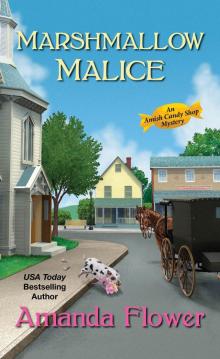 Marshmallow Malice
Marshmallow Malice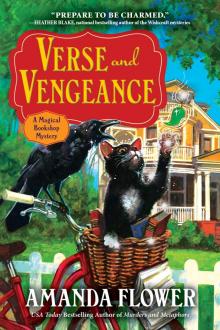 Verse and Vengeance
Verse and Vengeance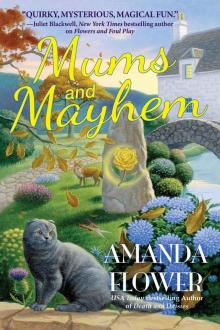 Mums and Mayhem
Mums and Mayhem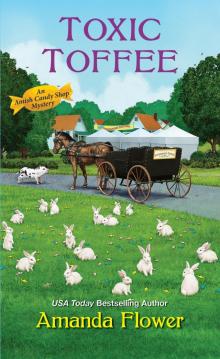 Toxic Toffee
Toxic Toffee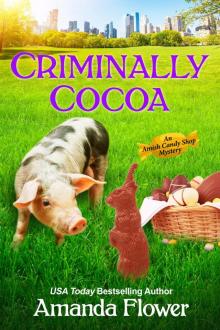 Criminally Cocoa
Criminally Cocoa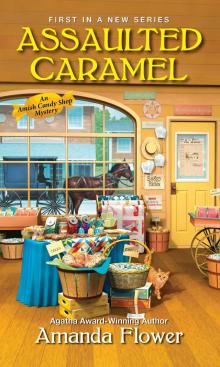 Assaulted Caramel
Assaulted Caramel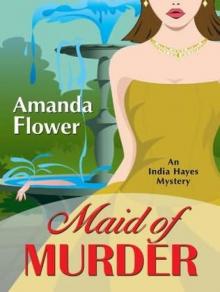 Maid of Murder aihm-1
Maid of Murder aihm-1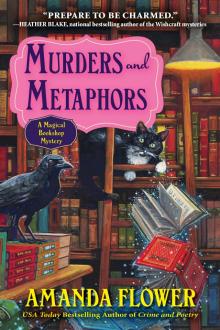 Murders and Metaphors
Murders and Metaphors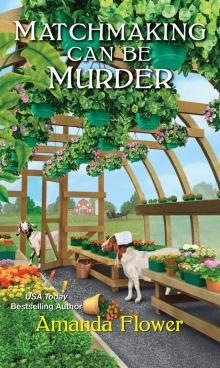 Matchmaking Can Be Murder
Matchmaking Can Be Murder Maid of Murder (An India Hayes Mystery)
Maid of Murder (An India Hayes Mystery)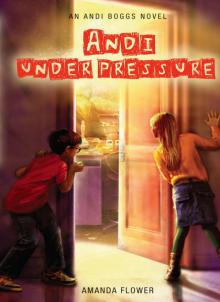 Andi Under Pressure
Andi Under Pressure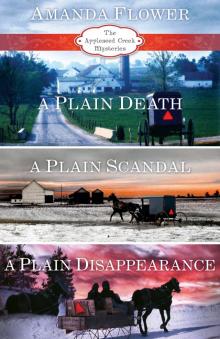 Appleseed Creek Trilogy, Books 1-3
Appleseed Creek Trilogy, Books 1-3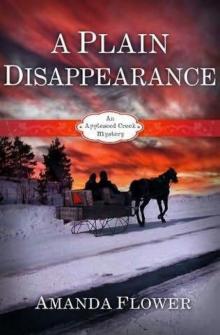 A Plain Disappearance
A Plain Disappearance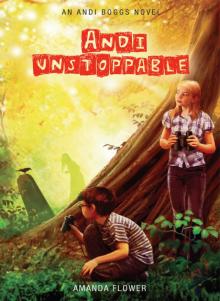 Andi Unstoppable
Andi Unstoppable The Final Vow
The Final Vow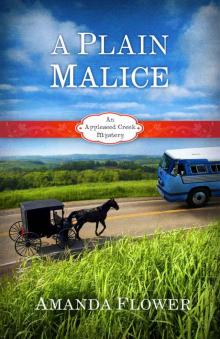 A Plain Malice: An Appleseed Creek Mystery (Appleseed Creek Mystery Series Book 4)
A Plain Malice: An Appleseed Creek Mystery (Appleseed Creek Mystery Series Book 4)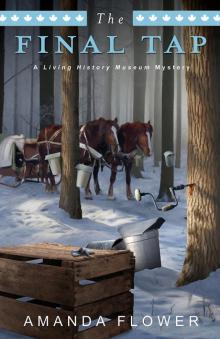 The Final Tap
The Final Tap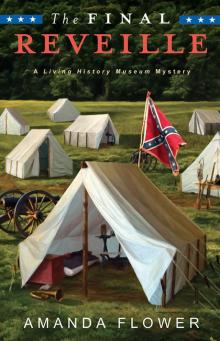 The Final Reveille: A Living History Museum Mystery
The Final Reveille: A Living History Museum Mystery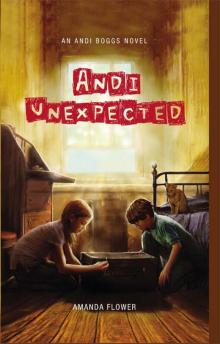 Andi Unexpected
Andi Unexpected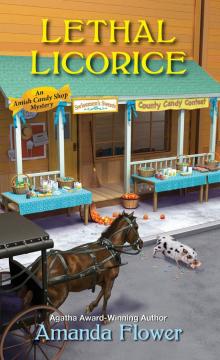 Lethal Licorice
Lethal Licorice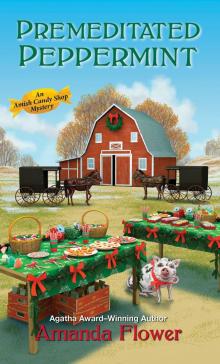 Premeditated Peppermint
Premeditated Peppermint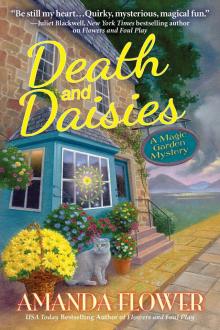 Death and Daisies
Death and Daisies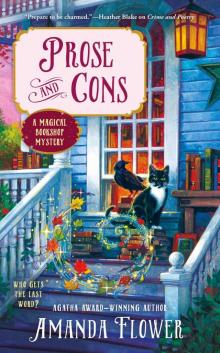 Prose and Cons
Prose and Cons